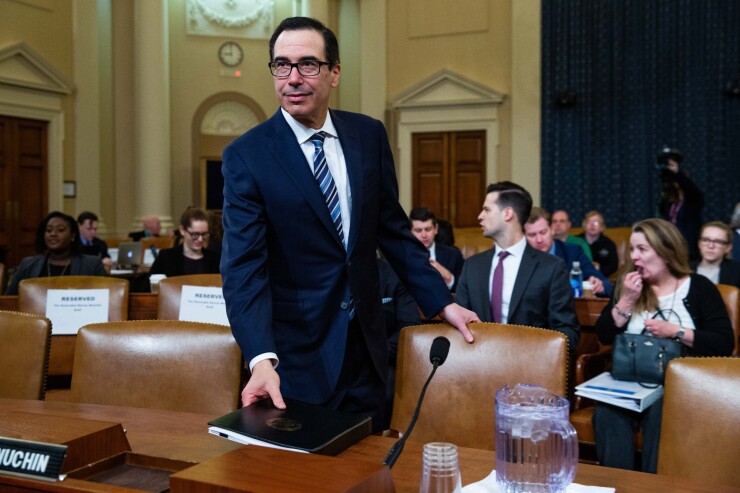Getting a tax refund is a springtime tradition that Americans love as much as Easter candy.
But fewer people are getting refunds this year and that’s causing angst for Republicans who want to convince voters that the 2017 tax overhaul really did give them a tax cut. If middle America can’t be persuaded, it could have big implications for the long-term viability of the overhaul, and how consumers spend their extra income.
Republicans are on the defensive. The once little-noticed ritual of releasing weekly refund data during the tax filing season has become politically fraught, with unfavorable data being released late on a Friday night, and better figures a week later causing Treasury Secretary Steven Mnuchin to take to cable news to tout success.

“Taxes are down so refunds should be down,” Mnuchin told the House Ways and Means Committee on Thursday. Mnuchin added that many people did not change their withholding and so refunds are consistent with last year.
Democrats see an opportunity to use the drop in refunds to hammer Republicans in the 2020 campaign for seeming to favor the wealthy and denying middle- and lower-income people the refunds they count on.
Polling shows the GOP has work to do. The tax law is the Republican Party’s signature legislative achievement, but still only about 39 percent of people approve of it, according to a series of polls conducted this year.
Representative Judy Chu, a California Democrat, said her office has received many calls from taxpayers complaining they didn’t get as big a refund as expected. Chu has introduced legislation that would lower penalties for people who didn’t withhold enough during 2018 as a result of the updated withholding tables. The Internal Revenue Service has eliminated some penalties for taxpayers who, in the first year of the new law, didn’t withhold enough.
“They depend on their refunds to pay bills, so they are quite upset,” Chu said. Senator Bob Casey, a Pennsylvania Democrat, predicts voters will remember their small refunds come 2020.
Early in the filing season, Mnuchin argued that smaller refunds meant people had more money in their pockets throughout the year. More recently, he’s pointed out that the refund numbers are coming into line with last year, a sign that he’s given up trying to convince the public that large refunds are less desirable.
Representative Dave Schweikert, an Arizona Republican on the House Ways and Means Committee, pointed to IRS data that shows the average refund is up compared to last year, a point that he said hadn’t been noticed.
“Even on the issue of tax refunds, it’s become politicized,” he said.
The GOP has some facts on its side. The number of refunds issued is down only 3.3 percent. And about 80 percent of filers received a tax cut under the new law, which lowered income tax rates and about doubled the standard deduction to $24,000 for a couple, according to estimates from the Urban-Brookings Tax Policy Center.
Yet the changes in withholding, which resulted in slightly higher paychecks, and the minimizing of popular write-offs, such as capping the deduction for state and local taxes at $10,000, made the changes more subtle than the arrival of a refund check.
Extra money may not seem like that much if it’s doled out in small amounts.
“It’s hard to diet if there is candy on the counter every Friday,” said Richard LeVine, a tax lawyer at Withers Bergman.
Americans seem to like to keep the candy out of sight until the spring refund season. The argument that the refund cycle means people are giving an interest-free loan to the government falls on deaf ears when the refund allows people to make a significant payment on a debt or pay for a vacation.
A poll done by Bankrate in 2015 shows that most Americans want a refund, ranging from 57 percent for those earning less than $30,000 to 63 percent for those earning between $50,000 and $74,999. And 53 percent of those who earn more than $75,000 prefer those springtime windfalls.
“Irrational as it might be, big refunds seem to be something that many households are comfortable with,” Nancy Van Houten, an economist at Oxford Economics, said. “People view it as savings that they wouldn’t save otherwise.”
Ultimately, it’s not yet known exactly how refunds will compare to last year. The IRS has issued about 53.5 million refunds, approximately 40 percent of the total anticipated for the year, as of March 8. National Taxpayer Advocate Nina Olson has said people who have a liability tend to file later, so the refund data could become bleaker as the filing season wears on.
Republicans have consistently lost the messaging battle on the tax overhaul. An internal Republican National Committee poll from before the 2018 midterm elections concluded that by a 2-to-1 margin, voters believe the changes helped the wealthy more than the average American.
Conservatives complain the the confusion about refunds has overshadowed the argument that the tax law has helped keep unemployment low and sustained the economic expansion.
“It’s unfortunate that the economic growth message lost out to discussion about how many dollars are in my paycheck,” said Adam Michel, a senior policy analyst at the Heritage Foundation.
Tax refunds also have economic sway, according to research from the JPMorgan Chase Institute. Those checks are often the biggest windfall of the year for many Americans, and those who receive refunds have higher bank-account balances for six months after the check arrives. Smaller-than-anticipated refunds could cut into some of the economic security that some taxpayers expect.
“The tax cut was never quite as popular as Republicans hoped and I don’t think the refund numbers help,” Van Houten said. “This will stick with people for a bit.”





